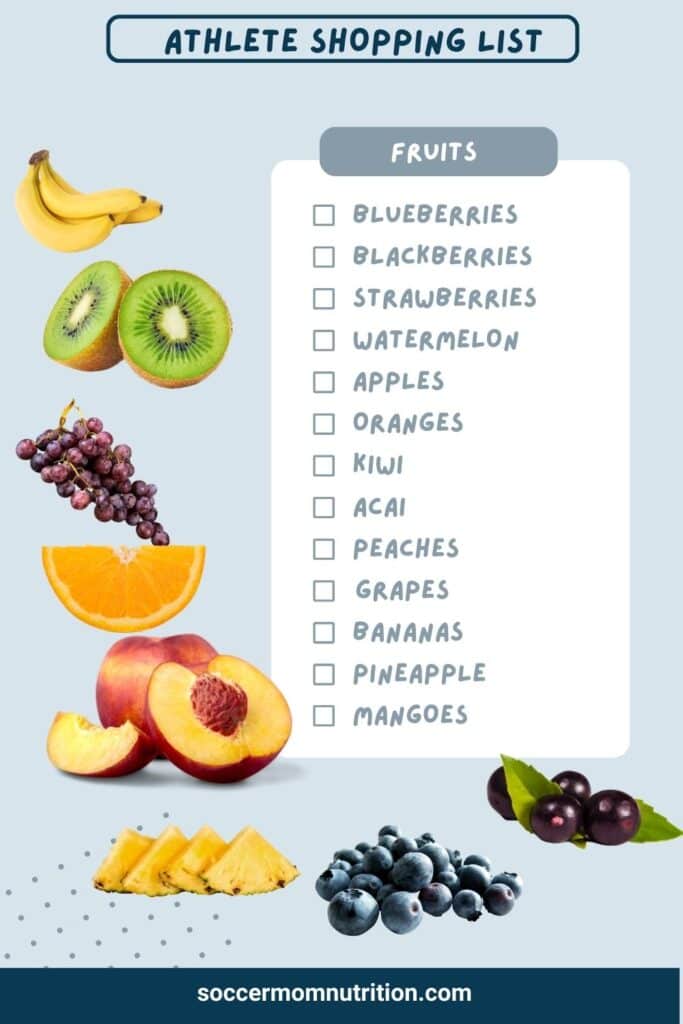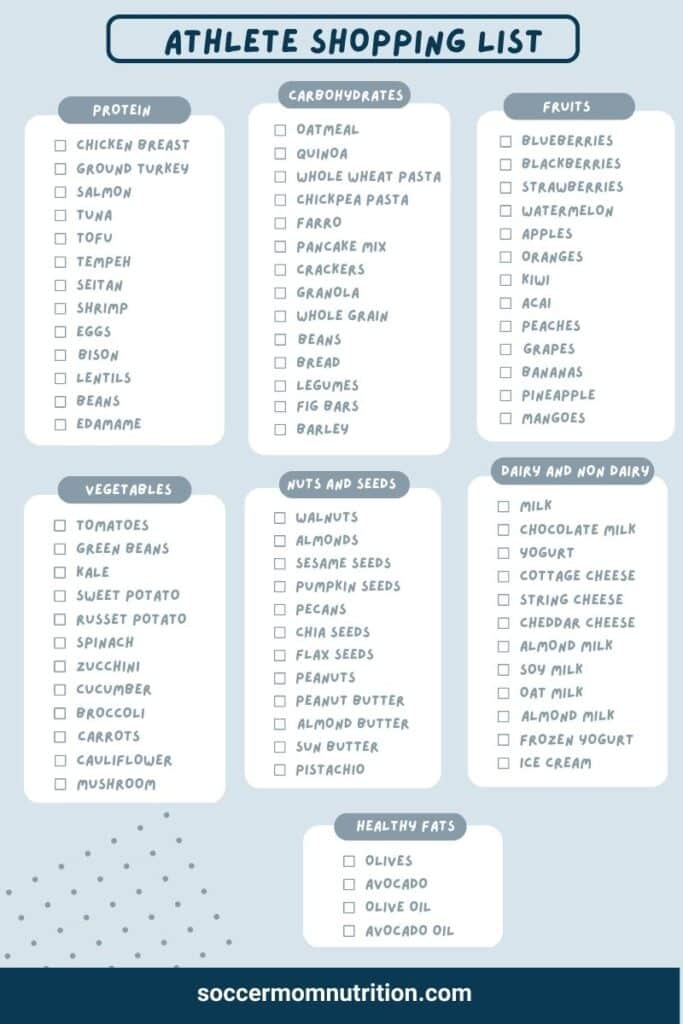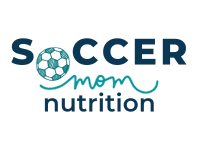Grocery List for Athletes Ultimate Guide
We all know how important it is to eat well, so we’re here to help with a grocery list for athletes.
Adding your favorite performance foods to your grocery list is especially important when you’re training hard or competing.
Eating a well-balanced diet that includes a variety of nutrient-rich foods can help you fuel your workouts, build and repair muscle and recover faster.
But have you ever walked into a grocery store and felt a little lost? With so many choices, it can be tough to figure out what to put in your cart.
In this post, we’ll give you some tips on how to grocery shop like a champ.

Please note that this article contains affiliate links. If you click one of these links and make a purchase, we may earn a commission. As an Amazon Associate, we earn from qualifying purchases.
Plan ahead for grocery shopping
Make a list
One of the keys to successful grocery shopping is to plan ahead. Before you hit the store, take some time to make a list of the foods you need for the week. Check out our post on meal prep for athletes for some ideas to use during planning.
Having a plan helps you stay focused so that you get the foods you need to fuel well for the week. So you’ll want to take into account the days that you’ll be on the go, need a pre game meal and need some quick and healthy snacks.
Will you have hard trainings this week? Or perhaps you’ll be focusing on nutrition for game day.
Also, if you’re a vegan athlete, we’ve got you covered with our vegan pantry staples list that will be a great addition to your athlete grocery list.
Know your route at the store
You can also save time by organizing your list by section of the store, such as produce, dairy, grains and proteins.
This way, you can move through the store quickly and efficiently.
You may have heard advice to shop the perimeter of the store.
While you’ll find most whole foods along the perimeter, many of the whole grains, dried or canned beans, rice, oatmeal, pancake mixes and carbohydrates you need for fuel are on the shelves in the middle.
Additionally you’ll find high fiber dry cereal, granola bars, applesauce and fruit snacks which are all important for an athlete’s overall performance nutrition plan. You’ll want to have snacks to fuel you pre game, halftime or post game.
Many stores have large bulk bin sections where you can find whole grains, high fiber granola, dried fruits and nuts. When shopping in the bulk section, think about trying new grains and legumes.
Also you can make your own trail mix with your favorite nuts and dried fruits.
With a little bit of planning, you can make grocery shopping a breeze!
Grocery store staples
A well-planned grocery list can make it easier to stick to a healthy eating routine.
Here are some essential items to include on a grocery list for athletes:
Protein sources
Protein is essential for building and repairing muscles, and athletes need to eat protein at both meals and snacks. Good sources of lean protein include chicken, turkey, fish, eggs, tofu and beans.
Carbohydrates
Carbohydrates provide your main source of energy for your body. When shopping for carbohydrates, choose foods with whole grain and whole wheat as the first ingredients.
Good whole grain options include brown rice, quinoa, oatmeal and whole wheat pasta.
Fruits and vegetables
Fruits and vegetables are packed with essential nutrients, fiber and antioxidants that help reduce inflammation and promote recovery.
Athletes should aim to include a variety of colors in their diet, such as leafy greens, broccoli, berries, citrus fruits and sweet potatoes.
While you’ll find a huge variety of fresh fruits and vegetables in the produce section, the selection in the frozen food aisle is good too.
It’s great to have frozen fruits and veggies on hand when you want to make a smoothie or add veggies to a quick meal or soup.

Nuts, seeds, and healthy fats
Nuts and seeds are a great source of healthy fats, key minerals and protein. They can be easily added to meals or eaten as snacks. You can buy nuts such as almonds, walnuts, chia seeds and flaxseeds in the bulk section.
Nut butters make great travel snacks and are also a key part of snacks and meals for athletes.
Dairy or non-dairy products
Dairy products such as milk, yogurt, cottage cheese and string cheese are a great source of calcium and protein. Low fat greek yogurt has more protein than regular yogurt and is a favorite of many athletes. You can also find high protein milk options to boost protein.
It’s a versatile snack and can be paired with berries and yogurt for a good mix of carbs and protein.
For vegan athletes or those with lactose intolerance, non-dairy alternatives such as soy milk, almond milk, rice or oat milk can be a good option, but make sure it’s fortified with vitamin D and calcium.
Snacks
Athletes need snacks to help you meet your energy needs. You also need to refuel your body after exercise. Having healthy snacks on hand can make it easier.
Good options include protein bars, low fat greek yogurt, fruit, nuts, string cheese, cottage cheese, whole grain crackers, vegetable sticks with hummus.
When you include these items in their grocery list, you can ensure you are fueling your body with the right nutrients to optimize performance and recovery.
Fluids
Athletes should also include hydration sources in their grocery list. Water is essential for regulating body temperature but also transporting nutrients and removing waste.
Sports drinks, coconut water, tart cherry juice and electrolyte tablets can also be included to replenish electrolytes lost during exercise.

In conclusion
In conclusion, grocery shopping can be overwhelming, but with a little planning and some knowledge about nutrient-dense foods, you can make the most of your shopping trips and fuel your body for success.
When you include a variety of foods from each food group in your grocery list for athletes, you’ll be sure to get the vitamins, minerals and nutrients that your body needs to perform at its best.
Also, remember to plan ahead, compare prices, and stay focused on your goals, and you’ll be well on your way to becoming a pro at grocery shopping for your athletic needs!
Join our mailing list and get our FREE Pre-Activity Fueling Guide.
Stephanie Magill, MS, RD, CD, FAND has over 22 years of experience in public health and nutrition. As a performance registered dietitian nutritionist, Stephanie specializes in sports nutrition and provides simple and actionable information so that athletes can be well fueled for high performance on and off the field. Stephanie has a Master’s Degree in Nutrition and is a Fellow of the Academy of Nutrition and Dietetics.

